towns
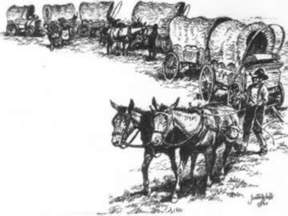 This summer when Bob and I were in the Black Hills, we were looking around in the gift shop at Mount Rushmore, when I came across a book called “Women’s Diaries Of The Westward Journey.” Since then, I have been thinking about what it must have been like to travel in a covered wagon…especially for a woman. Of course, times were different back then, and people did not have the luxury of a daily shower, or even a real bathroom…and that was in their own homes. So, imagine what life would be like on a wagon, traveling in a wagon train headed west in the mid-1800s. As the emigrants were traveling west, they were making their own roads, hunting their own food, and cooking over a campfire. For a lot of people, I’m sure this sounds like going camping, but then imagine doing it for months at a time. A day’s travel averaged about twelve to twenty miles, meaning that on the plains, they often stopped for the day within sight of the site they had just left that morning. For travelers now, that would seem insanely slow, but for the wagon trains, it was just the normal day’s journey. They knew no other way.
This summer when Bob and I were in the Black Hills, we were looking around in the gift shop at Mount Rushmore, when I came across a book called “Women’s Diaries Of The Westward Journey.” Since then, I have been thinking about what it must have been like to travel in a covered wagon…especially for a woman. Of course, times were different back then, and people did not have the luxury of a daily shower, or even a real bathroom…and that was in their own homes. So, imagine what life would be like on a wagon, traveling in a wagon train headed west in the mid-1800s. As the emigrants were traveling west, they were making their own roads, hunting their own food, and cooking over a campfire. For a lot of people, I’m sure this sounds like going camping, but then imagine doing it for months at a time. A day’s travel averaged about twelve to twenty miles, meaning that on the plains, they often stopped for the day within sight of the site they had just left that morning. For travelers now, that would seem insanely slow, but for the wagon trains, it was just the normal day’s journey. They knew no other way.
People back then would have been somewhat crazy to set out alone for the west…or to set out any later than spring, because either scenario was bound to fail. They needed the protection of the wagon train, as well as the 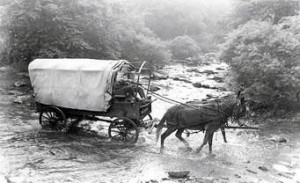 additional supplies, should a wagon be lost to fire, a river crossing, or an attack by Indians. It was their back up plan. They couldn’t just stop at the next town at a store and buy more supplies. There were no towns, stores, or even roads. When we travel, even in the rural state of Wyoming that I live in, we are used to seeing miles with very little to catch the eye, other that an occasional farm house, and an occasional town, but remember that we have roads to follow so we don’t lose our way. And even then, many of us use GPS to make sure we are taking the right road. They had none of that. They had to use the sun and landmarks to make sure they were going the right direction. They depended on people who had taken this trip before them. It was all they had. I think most of us today would go nuts if we never saw a house, a road, or a town. We would wonder if we were insane for setting out on this crazy adventure at all. One woman wrote to her husband, who was waiting at the end of the line, with the spelling ability she had at the time, “I can tell you nothing only that were hear and its strange I wish we had never started … it seems impossible to get their.” She had set out in a wagon train with her four children, without her husband, and that in itself must have been scary.
additional supplies, should a wagon be lost to fire, a river crossing, or an attack by Indians. It was their back up plan. They couldn’t just stop at the next town at a store and buy more supplies. There were no towns, stores, or even roads. When we travel, even in the rural state of Wyoming that I live in, we are used to seeing miles with very little to catch the eye, other that an occasional farm house, and an occasional town, but remember that we have roads to follow so we don’t lose our way. And even then, many of us use GPS to make sure we are taking the right road. They had none of that. They had to use the sun and landmarks to make sure they were going the right direction. They depended on people who had taken this trip before them. It was all they had. I think most of us today would go nuts if we never saw a house, a road, or a town. We would wonder if we were insane for setting out on this crazy adventure at all. One woman wrote to her husband, who was waiting at the end of the line, with the spelling ability she had at the time, “I can tell you nothing only that were hear and its strange I wish we had never started … it seems impossible to get their.” She had set out in a wagon train with her four children, without her husband, and that in itself must have been scary.
Days on the wagon train began long before dawn with a simple breakfast of coffee, bacon, and dry bread. After breakfast, the people secured their supplies, hitched up their teams, and hit the trail by seven o’clock in the morning. Most people walked because of lack of space, and the fact that the wagon was so uncomfortable. The 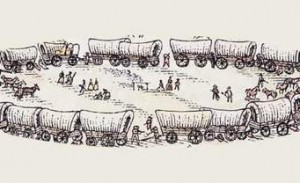 train stopped at noon for a cold meal of coffee, beans, and bacon, which had been prepared that morning. During this break, called nooning, men and women would gather and talk, children would play, and animals would rest. After that, the travel would continue until around six o’clock in the evening, when they wagons would circle for the night. Some people would visit after supper, but most went to bed, because they were exhausted. Some slept in the wagon, but most slept on the ground, because oddly enough it was more comfortable. While traveling west on the wagon trains was a necessary journey to be made to grow this country, it was not an easy journey to make, and for that reason, I have to stand in awe of those who did it.
train stopped at noon for a cold meal of coffee, beans, and bacon, which had been prepared that morning. During this break, called nooning, men and women would gather and talk, children would play, and animals would rest. After that, the travel would continue until around six o’clock in the evening, when they wagons would circle for the night. Some people would visit after supper, but most went to bed, because they were exhausted. Some slept in the wagon, but most slept on the ground, because oddly enough it was more comfortable. While traveling west on the wagon trains was a necessary journey to be made to grow this country, it was not an easy journey to make, and for that reason, I have to stand in awe of those who did it.
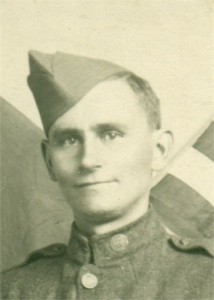 When my grandfather, George Floyd Byer was in the service during World War I, he started out as a cook, and later became the chief cook…or basically the man in charge. He was well respected by all the men under him. In fact, he and his men got along so well that they even liked spending their leave time together. A lot of the time, men on leave hang out with other guys in their unit, but not usually the ones who are above them, nevertheless, Grandpa’s men didn’t seem to mind at all. Or maybe it was just different back then.
When my grandfather, George Floyd Byer was in the service during World War I, he started out as a cook, and later became the chief cook…or basically the man in charge. He was well respected by all the men under him. In fact, he and his men got along so well that they even liked spending their leave time together. A lot of the time, men on leave hang out with other guys in their unit, but not usually the ones who are above them, nevertheless, Grandpa’s men didn’t seem to mind at all. Or maybe it was just different back then.
Whether a person is excited about being stationed in another country or not, it is a good opportunity to see the world. Even in World War I, when it was not quite as easy to get to so many places, they could still see the towns around them, and like my grandfather, sometimes they get to see a castle in France. This was the case when my grandfather and some of his men went on leave. I don’t know how much of 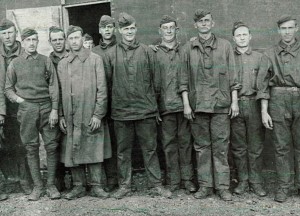 the castle they got to see, but they were able to say that they had been to one, and that is a very cool thing in the World War I days.
the castle they got to see, but they were able to say that they had been to one, and that is a very cool thing in the World War I days.
My grandfather was always a very respected man, in the service and out of it. Nevertheless, it is hard for me to imagine him in the service. He was such a gentle man…like my dad, and it’s hard for me to imagine my dad in the service too. Neither of them seem like a person who could possibly kill someone. I guess that war is just different. It truly is kill or be killed, and you do what you have to do to stay alive and watch the backs of the men you serve with. I can very much imagine my grandfather and my dad doing that. They were both honorable men, and while killing a human being is something neither would ever do for no good reason, when it comes to protecting their family or their comrades, they did what they had to do.
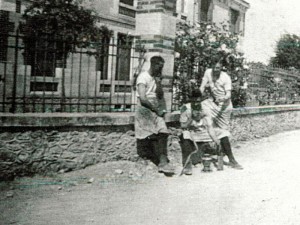
Knowing how loyal my grandfather was to his men, I can totally see why they respected him so much. He was kind and caring, not just to his family, but to his men, because men who are far away from home during a war, are definitely dealing with a lot of emotions. It helps to have someone in charge who can understand how you feel, and give you advise when it is needed. That’s how my grandfather was. Today would have been Grandpa Byer’s 121st birthday. I wish he could still be with us…I miss him. Happy birthday in Heaven Grandpa. We love you.
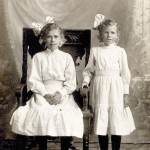 These days, with most towns having multiple schools, our school days are often taken for granted, and even viewed…by many students and boring, grueling, and basically something to get through and over with, so they can move on to real life. But, schooling in the old west, and even into the mid 1900’s wasn’t always such an easy thing to accomplish. As our nation grew, and people spread out across its vastness, schools were one thing in short supply. Many parents had to home school their children, which is becoming more of a luxury item these days, because with home schooling, comes the loss of one income, and many people can’t or don’t want to make it on one income.
These days, with most towns having multiple schools, our school days are often taken for granted, and even viewed…by many students and boring, grueling, and basically something to get through and over with, so they can move on to real life. But, schooling in the old west, and even into the mid 1900’s wasn’t always such an easy thing to accomplish. As our nation grew, and people spread out across its vastness, schools were one thing in short supply. Many parents had to home school their children, which is becoming more of a luxury item these days, because with home schooling, comes the loss of one income, and many people can’t or don’t want to make it on one income.
When my great grandparents, Carl and Henriette Schumacher moved their family from Minnesota to North Dakota, they were quite a way from the school, but they saw the importance of educating their children. The family spoke German at home, and when the older children started school, the teachers made fun of their lack of the knowledge of the English language. Henriette immediately set out to change that. German would no longer be spoken in the home. The whole family would make the switch to English. The distance to school was a big problem, but Carl made sure that his children were there…no matter what.
That worked well for the older children, but at that time in history, many children didn’t go to school after the 6th grade, and some quit sooner. So, when Bertha and Elsa, the youngest children were in school, a new problem presented itself. The school was nearer to them now, but often there were not enough students to warrant keeping it open, thus their education became hap-hazard. That is not to say that they did not get their education, because they did, and even went on to college. Theirs was just a little bit different than their older siblings.
Bertha tells of going to school in the small school, with very few students, but she also talks of the year they were home schooled but their oldest sister, my future grandmother, Anna. She talks of the time that they spent in a small house in Lisbon, with Mina staying with them so they could go to school. And of course, there were the times they went by horse and buggy into school. Those were hard times, and I have to wonder how the girls kept up with the other students, and were able to continue on to the high school in Lisbon. It’s not that I wondered about my grandmother’s ability to teach, but with little or no regulation, how did the school in Lisbon know anything about their prior education.
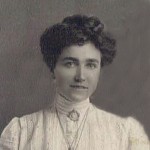
I suppose they had to take some kind of test or visit with the teacher for a time so they could determine where they were in their education, and therefore could be placed in one grade or another. I know that often in homeschooling situations today, the students are ahead of their age group, but I still wonder if that was the case then, because their materials were few and there was really no clear way to know if the teacher was keeping up with other classes for their pupils’ age groups. Those must have been hard and confusing times for Bertha and Elsa. Nevertheless, they both finished school, like their older siblings, and went on to college, but their education was definitely at The School of Hap-Hazard.
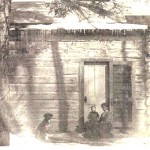 In years gone by, when it wasn’t as easy to get to your job site as it is today, many people lived as near their work as possible, especially when their work was out in the woods. Jobs in the cities and towns don’t require long drives, but when you travel on a horse, and work from sunrise to sunset; it’s nice to be close to home. Working in the logging industry, like my grandparents did, living in the woods was just part of the job.
In years gone by, when it wasn’t as easy to get to your job site as it is today, many people lived as near their work as possible, especially when their work was out in the woods. Jobs in the cities and towns don’t require long drives, but when you travel on a horse, and work from sunrise to sunset; it’s nice to be close to home. Working in the logging industry, like my grandparents did, living in the woods was just part of the job.
I’m told that their little cabin in the woods was near International Falls, Minnesota, where their daughter, my Aunt Laura was born. I would imagine that the winters were very cold there, and the best thing for anyone who could was to stay indoors, but them I seriously doubt that my grandmother was a woman who was afraid of a little but of cold and snow. Still, the cold and snow would really make it hard to work out in the woods…nevertheless, that was the job that had to be done. Maybe that was another good reason to live near your work. You could get home to the nice warm house sooner, and maybe 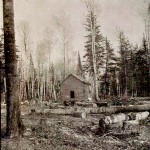 even be able to go home for lunch.
even be able to go home for lunch.
When I look at these pictures, it reminds me of the “Little House on the Prairie” books. Everywhere you look seems to be a new adventure. I can imagine how the Ingalls girls felt living there…the adventures they must have had…the adventures my Aunt Laura must have had there, playing with the children of the other logging families that lived in the woods too. I’m sure there was an abundance of forest animals to see and be in awe of. I love photographing the animals…when I happen to be in the right place at the right time. The pictures can be amazing. I can imagine all the beauty all around the little cabin in the woods.

